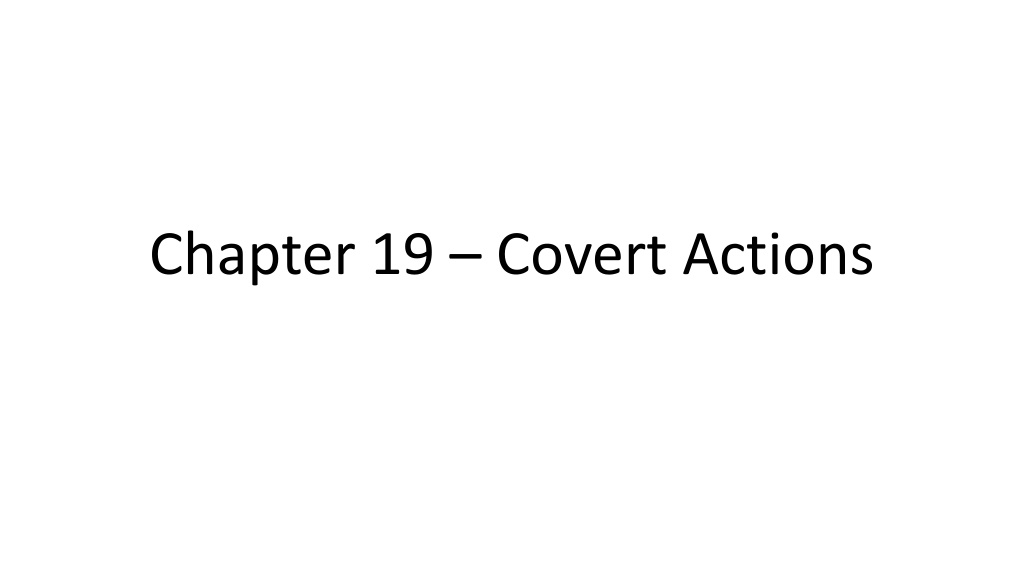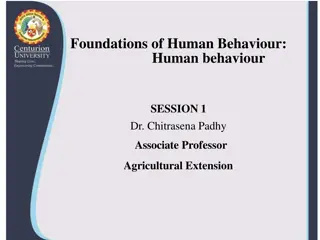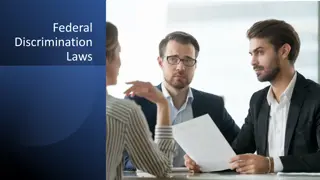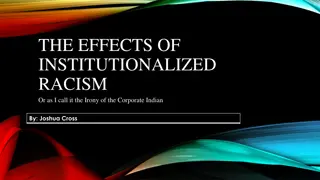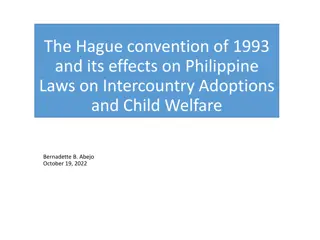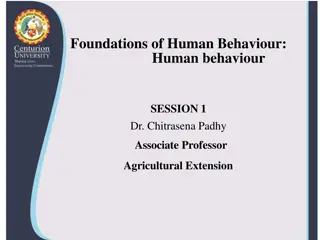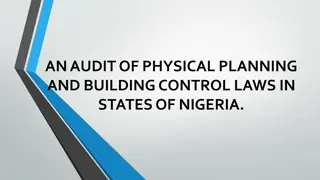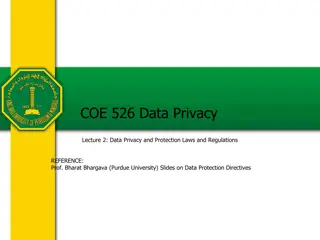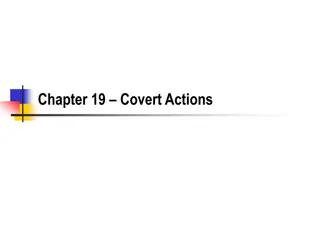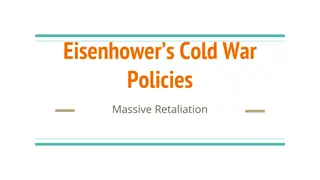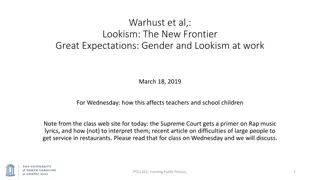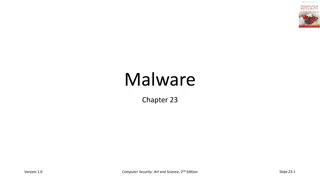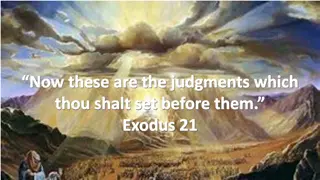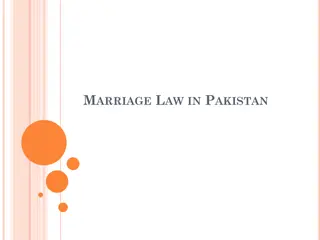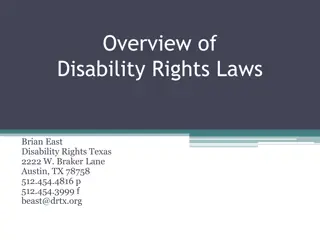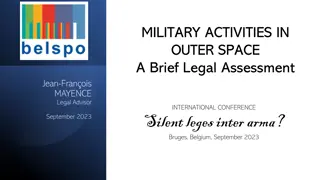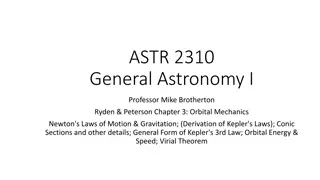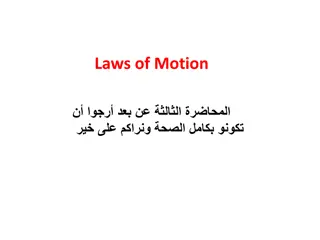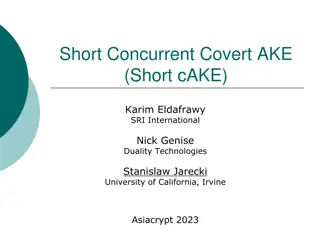Covert Actions and Laws: A Historical Overview
Covert actions, unconstrained by domestic laws, have been historically carried out by various entities in different ways. This overview delves into the Intelligence Authorization Act of 1991, limitations imposed by Congress, utilization of private contractors, challenges in enforcement, and relevant acts like the Neutrality Act of 1794 and the Logan Act of 1799.
Download Presentation

Please find below an Image/Link to download the presentation.
The content on the website is provided AS IS for your information and personal use only. It may not be sold, licensed, or shared on other websites without obtaining consent from the author. Download presentation by click this link. If you encounter any issues during the download, it is possible that the publisher has removed the file from their server.
E N D
Presentation Transcript
Learning Objectives Covert actions are foreign actions, unconstrainted by the Constitution or domestic law. Historically, Congress did not constrain covert actions. The Intelligence Authorization Act of 1991 requires reporting covert actions to congress, limiting plausible deniability. Enforcement of Congressional limitations is still limited. The CIA is tasked with covet actions, but the military is also used. Work is increasingly pushed to private contractors, which are outside of the government or military command and control structure. Standing makes it difficulty for individuals and NGOs to challenge covert actions in court. 2
Neutrality Act of 1794 Whoever, within the United States, knowingly begins or sets on foot or provides or prepares a means for or furnishes the money for, or takes part in, any military or naval expedition or enterprise to be carried on from thence against the territory or dominion of any foreign prince or state, or of any colony, district, or people with whom the United States is at peace, shall be fined under this title or imprisoned not more than three years, or both. 4
Jefferson on the Neutrality Act Jefferson on the Neutrality Act If one citizen has a right to go to war of his own authority, every citizen has the same. If every citizen has that right, then the nation (which is composed of all its citizens) has a right to go to war, by the authority of its individual citizens. But this is not true either on the general principles of society, or by our Constitution, which gives that power to Congress alone and not to the citizens individually. (not in the book) 5
Logan Act - 18 U.S. Code 953. (1799) Any citizen of the United States, wherever he may be, who, without authority of the United States, directly or indirectly commences or carries on any correspondence or intercourse with any foreign government or any officer or agent thereof, with intent to influence the measures or conduct of any foreign government or of any officer or agent thereof, in relation to any disputes or controversies with the United States, or to defeat the measures of the United States, shall be fined under this title or imprisoned not more than three years, or both. 6
The History of the Logan Act Could this have been used against Jane Fonda in the Vietnam War? What about Nancy Pelosi visiting Syria? The 47 Senators who wrote to Iran warning it not to make a deal with Obama? Has the law been enforced? Last indictment was 1803! Desuetude the implicit repeal of criminal laws through disuse. What are the 1st amendment issues under modern Supreme Court precedent? 7
National Security Act of 1947 perform such other functions and duties related to intelligence affecting the national security as the President or the Director of National Intelligence may direct, 50 U.S.C. 403-4a(d)(4) 9
Why is it Hard to Know What Covert Action Meant in Why is it Hard to Know What Covert Action Meant in 1947? 1947? Finally, the contemporary term covert action had no clearly understood forebear in 1947. While the terms operational activities, special operations, and direct activities were all used, they were employed to refer to secret collection of intelligence as well as to covert action. Why might the formal congressional record not be an accurate picture of whether congress intended for the CIA to carry out cover actions? They wanted to keep it secret 10
What did the CIA General Counsel Say in 1947? Taken out of context and without knowledge of its history, these Sections could bear almost unlimited interpretation, provided that the services performed could be shown to be of benefit to an intelligence agency or related to national intelligence. In our opinion, however, either activity would be an unwarranted extension of the functions authorized in Sections [ 3036d(4)]. This is based on our understanding of the intent of Congress at the time these provisions were enacted. 11
Annex NSC-4[/]A, Adopted by the NSC at its First Meeting NSC-4[/]A, which empowered the Secretary of State to coordinate information activities designed to counter communism. A top secret annex took cognizance of the vicious psychological efforts of the USSR, its satellite countries, and Communist groups to discredit and defeat the activities of the U.S. and other Western powers. The NSC determined that in the interests of world peace and U.S. national security the foreign information activities of the U.S. government must be supplemented by covert psychological operations 12
NSC-10/2, Which Superseded NSC-4[/]A The CIA was authorized to undertake economic warfare, sabotage, subversion against hostile states (including assistance to guerrilla and refugee liberation groups), and support of indigenous anti- communist elements in threatened countries. . . . 13
Office of Special Projects ( Office of Special Projects (OSP OSP) ) [U]nder the authority of 50 U.S.C. [403-4a(d)(4)], the NSC ordered the establishment in CIA of the Office of Special Projects (OSP), to conduct covert action. The Chief of OSP was to receive policy guidance from the Secretary of State and the Secretary of Defense. OSP (later, OPC) [Office of Policy Coordination] was to operate independently of all components of the CIA to the maximum degree consistent with efficiency. 14
Expanding Covert Actions during the Cold War From a 1954 Report It is now clear that we are facing an implacable enemy whose avowed objective is world domination by whatever means and at whatever cost. There are no rules in such a game. Hitherto acceptable norms of human conduct do not apply. If the U.S. is to survive, longstanding American concepts of ''fair play'' must be reconsidered. We must develop effective espionage and counterespionage services and must learn to subvert, sabotage, and destroy our enemies by more clever, more sophisticated, and more effective methods than those used against us. It may become necessary that the American people be made acquainted with, understand and support this fundamentally repugnant philosophy. [Quoted in Church Comm. Rep., supra p. 478, bk. I, at 50.] 15
The Bay of Pigs Richard M. Nixon proposed it Dwight D. Eisenhower planned it Robert F. Kennedy championed it John F. Kennedy approved it The CIA carried it out 1,197 invaders were captured 200 of them had been soldiers in Batista's army (14 of those were wanted for murder in Cuba) One CIA soldier fired the first shot A volunteer teacher was the first Cuban casualty 4 American pilots and over 100 Cuban invaders were killed in battle 1,400 Cuban invaders felt betrayed by their sponsor One U.S. senator lied to the United Nations One U.S. president was embarrassed in front of the world Lead to Cuban Missile Crisis CIA Motto - Killing Castro for Fifty Years Did it get Kennedy assassinated? 17
Bay of Pigs Legal Issues Why Cuban nationals and not US soldiers? What about using aircraft painted to look like Cuban air force planes to bomb Cuban airports? Was this a United Nations issue? One of the major newspapers had the information before the invasion but sat on it at the government s request. Kennedy later quipped that he would have been better off if they had printed it and stopped the invasion. 18
The Cold War Through Vietnam Archetypical good old boy organization. Ivy league universities and old money networks. Cozy personal relationships with influential congressional members. Mostly based on plausible deniability Don t ask, we won t tell This extended to not questioning the many CIA failures, especially in the USSR, China, and Cuba. 20
The CIA Budget Exemption from Rules on Using Public Funds The 1949 Central Intelligence Agency Act grants expansive authority to the CIA concerning the transfer and use of public funds. The Act states that sums made available to the CIA may be expended without regard to the provisions of law and regulations relating to the expenditure of Government funds. 21
The CIA Budget Transfer from Other Agencies by OMB Moreover, instead of direct appropriations to the CIA, the 1949 Act authorizes the Agency to transfer to and receive from other government agencies such sums as may be approved by the Office of Management and Budget (OMB) for any of the functions or activities authorized by the National Security Act of 1947. Other agencies are also permitted to transfer or receive from the CIA such sums without regard to any provisions of law limiting or prohibiting transfers between appropriations. 22
The CIA Budget Hiding the Appropriation Thus, funds for the intelligence community are first concealed in various inflated appropriation bills and then secretly transferred by OMB to the intelligence agencies after the bills are enacted. 23
United States v. Richardson, 418 U.S. 166 (1974) The Statement and Account Clause No Money shall be drawn from the Treasury, but in Consequence of Appropriations made by Law; and a regular Statement and Account of the Receipts and Expenditures of all public Money shall be published from time to time. Richardson asked the Treasury Department to give an accounting of the money spent by the CIA. He then sued, asking for an accounting. 24
The Taxpayer Standing Problem Taxpayers can get standing if the government is spending money unconstitutionally Flast. This was pretty much limited to establishment clause cases. Taxpayers cannot get standing to complain about government policy. The lower court found that Richardson had standing to request an accounting. 25
Richardson at the United States Supreme Court The court found that he did not have standing because he was not complaining of unconstitutional spending. As dicta: it is clear that Congress has plenary power to exact any reporting and accounting it considers appropriate in the public interest. It is therefore open to serious question whether the Framers of the Constitution ever imagined that general directives to the Congress or the Executive would be subject to enforcement by an individual citizen. historical analysis of the genesis of cl. 7 suggests that it was intended to permit some degree of secrecy of governmental operations. 26
CIA Activities in Chile At the direction of the White House and interagency policy coordination committees, CIA undertook : : : sustained propaganda efforts, including financial support for major news media, against Allende and other Marxists. President Nixon instructed Helms and the CIA not to inform the 40 Committee (then the executive decision-making body on covert operations), the State or Defense Departments, or the ambassador in Santiago. Staff of the S. Select Comm. to Study Governmental Operations with Respect to Intelligence Activities, Support for Coup in 1970. Awareness of Coup Plotting in 1973. Because CIA did not discourage the takeover and had sought to instigate a coup in 1970 probably appeared to condone it. 27
What caused Congress to try to increase its oversight of the CIA? CIA covert actions in Chile during the 1960s and early 1970s, designed to discredit left-leaning political leaders and to prevent them from assuming power, along with Watergate and the Southeast Asia war, all served to focus public attention on the CIA and crystalize congressional determination to investigate intelligence abuses. 28
The War Powers Resolution One of the actions that lead to the passage of the War Powers Resolution was Nixon s secret war in Cambodia. Congress rejected an amendment to the WPR that would have applied to private armies under contract or direction of the government. The WPR only applies to the United States Armed Forces. Does this implicitly endorse CIA covert actions? 29
The Hughes-Ryan Amendment - Funding Limits (1974) Discussed previously and superseded in 1991. (a) No funds appropriated under the authority of this or any other Act may be expended by or on behalf of the Central Intelligence Agency for operations in foreign countries, other than activities intended solely for obtaining necessary intelligence, unless and until the President finds that each such operation is important to the national security of the United States and reports, in a timely fashion, a description and scope of such operation to the appropriate committees of the Congress... 30
Plausible Deniability How can plausible deniability let subordinates hijack policy? How does the Hughes-Ryan Amendment try to end plausible deniability, as well as don t ask, don t tell for congressional oversight? What does this tell us about question of whether CIA is authorized to carry out covert actions? What is the recourse if the president does not comply with this law? 31
The US Embassy Hostages as Backdrop Carter negotiated the release of the hostages, with part of the deal being the basis for Dames v. Moore, which we discussed in an earlier chapter. Carter s providing sanctuary to the Shah triggered the hostage taking and made Carter the embodiment of the great Satin. The hostages were not released until Reagan was sworn in. Reagan saw the hostages as fatally weakening the Carter presidency. 33
Hostage taking in Lebanon The US Embassy Hostages in Iran as Backdrop Carter negotiated the release of the hostages, with part of the deal being the basis for Dames v. Moore, which we discussed in an earlier chapter. Reagan saw the hostages as fatally weakening the Carter presidency. US hostages, along those from other countries, were taken in Lebanon early in Reagan s presidency. This upset Reagan personally and was bad political publicity. Other countries were negotiating deals to ransom their hostages, but Reagan took a no-negotiating with terrorists position. 34
Iran and Iraq The CIA helped install the Shah of Iran and he was a close ally of the US The US had a long and mostly hostile relationship with Iraq prior to 1980, driven by Cold War politics. After the fall of the Shah and ensuing turmoil, Iraq invaded Iran in 1980, leading to a long, bloody war. At this point, Iraq and Saddam Hussein became great friends of the US, and the US poured arms and support into Iraq. 35
Nicaragua US Marines stabilize US friendly government from 1912- 1933. Opposed by rebel leader, Augusto C. Sandino In 1933, Sandino is part of a three-way government with Somoza Somoza kills Sandino and his family rules until forced out by Sandinista rebels in 1979 US opposes Sandinistas, supporting Contra rebels, even after Sandinistas are elected in 1984 Sandinistas lose elections in 1990 and are out of power until they win again in 2006. They have been in power since 2007. 36
Congressional Politics and Nicaragua This is right after the Church Committee has documented a long history of abuses by the CIA, including involvement in coups and assassinations in South and Central America. Nicaragua has deposed a long-time dictator and installed an elected government, if hostile to the US. 37
The Contra Finding What finding did Regan make on 1 Dec 1981 and convey to the Congressional intelligence committees? authorized the CIA to [s]upport and conduct . . . paramilitary operations against the Cuban presence and Cuban Sandinista support infrastructure in Nicaragua and elsewhere in Central America. What was the stated purpose of this finding? ...interdiction of arms shipments from Nicaragua to the leftist insurgents in El Salvador... 38
Mining the harbor of Managua, Nicaragua Ignoring the Hughes-Ryan amendment, the CIA mines the harbor on Managua without the President notifying Congress. This hits the news, leading to the Boland Amendment. This also spawned the ICC case we read in an earlier chapter. 39
The Boland Amendment No appropriations or funds made available pursuant to this [authorization bill] to the Central Intelligence Agency, the Department of Defense, or any other agency or entity of the United States involved in intelligence activities may be obligated or expended for the purpose or which would have the effect of supporting, directly or indirectly, military or paramilitary operations in Nicaragua by any nation, group, organization, movement, or individual. [Pub. L. No. 98-473, 8066(a), 98 Stat. 1837, 1935 (1984).] 40
Iran as Intermediary with the Hostage Takers No negotiating with terrorists and no ransom. It was OK to have a third-party country try to influence the hostage takers. If that includes money, just don t tell us. Iran is a position to be the intermediary, but it is our enemy, and we are supporting Iraq in its war against Iran. What to do? 41
The Arms Deal At first the US does not want to sell arms directly to Iran, so Israel is brought in as a broker. Israel wants to improve its relationship with the US. Arms are transferred to Israel, who sells them to Iran. Later the US sells arms directly to Iran. These go to Iranian moderates 42
Linking in the Contras The Boland Amendment blocks the use of Congressional funds to support the Contras or to support the US forces supporting the Contras. The arms deal with Iran is generating cash outside congressional appropriations, so why not use it to support the Contras? It was generally assumed that the Constitution does not allow the president to use funds outside of appropriations unless authorized by Congress. 43
Arms Export Control Act What does the AECA require before foreign arms sales? the transfer will strengthen the security of the United States and promote world peace, and unless the transferee agrees in writing not to further transfer the items without obtaining the consent of the President. Reagan only gave oral approval and did not notify Congress The AECA forbids transfer to states involved with international terrorism, such as Iran, unless the President makes a specific finding that the sale is necessary for national security and notifies Congress. This finding was not shared with Congress. 44
Interpreting Boland First, does the language any other agency or entity cover only agencies traditionally involved in intelligence operations, or does it also apply to any entity that is actually so involved? Second, does involved encompass indirect support? Third, does the phrase no funds available apply only to the then-current DOD appropriation or to all government funds? How did the White House try it take advantage of its interpretation questions to get around Boland II? 45
Dealing with the Boland Amendment What are the arguments that the Boland Amendment is unconstitutional? Before the arms for hostages deal, the administration was seeking donations from wealthy individuals and other countries to fund the Contras. Secretary of State Schultz reported to the President that the White House Chief of Staff believed that it would be an impeachable offense to funnel third- party money to the Contras. 46
US v. Terrell, 731 F.Supp 473 (1989) Prosecution based on the Neutrality Act, for shipping arms to the Contras. The court dismissed an argument that United States was at peace with Nicaragua within the meaning of the Act as absurd, given the unceasing efforts of the executive branch to support the Contra cause Does this mean that the Act never applies if our private army attacks someone, thus ending the peace? 47
The Independent Counsel The attorney general (Meese) requested an independent counsel Judge Lawrence Walsh was appointed Became a huge project Indicted Poindexter, North, Secord, and Hakim Conspiracy to violate the Boland Amendment Obstruction of justice Money crimes related to improper expenditures 49
Problems with the Prosecutions Complicated because they had been granted immunity so they would testify before congress Did congress intend to stop the prosecution? Is it better to have the hearing or a conviction? The White House refused to turn over classified documents requested by North's attorneys, resulting in the dismissal of most of the money crimes Is criminal prosecution appropriate? 50
